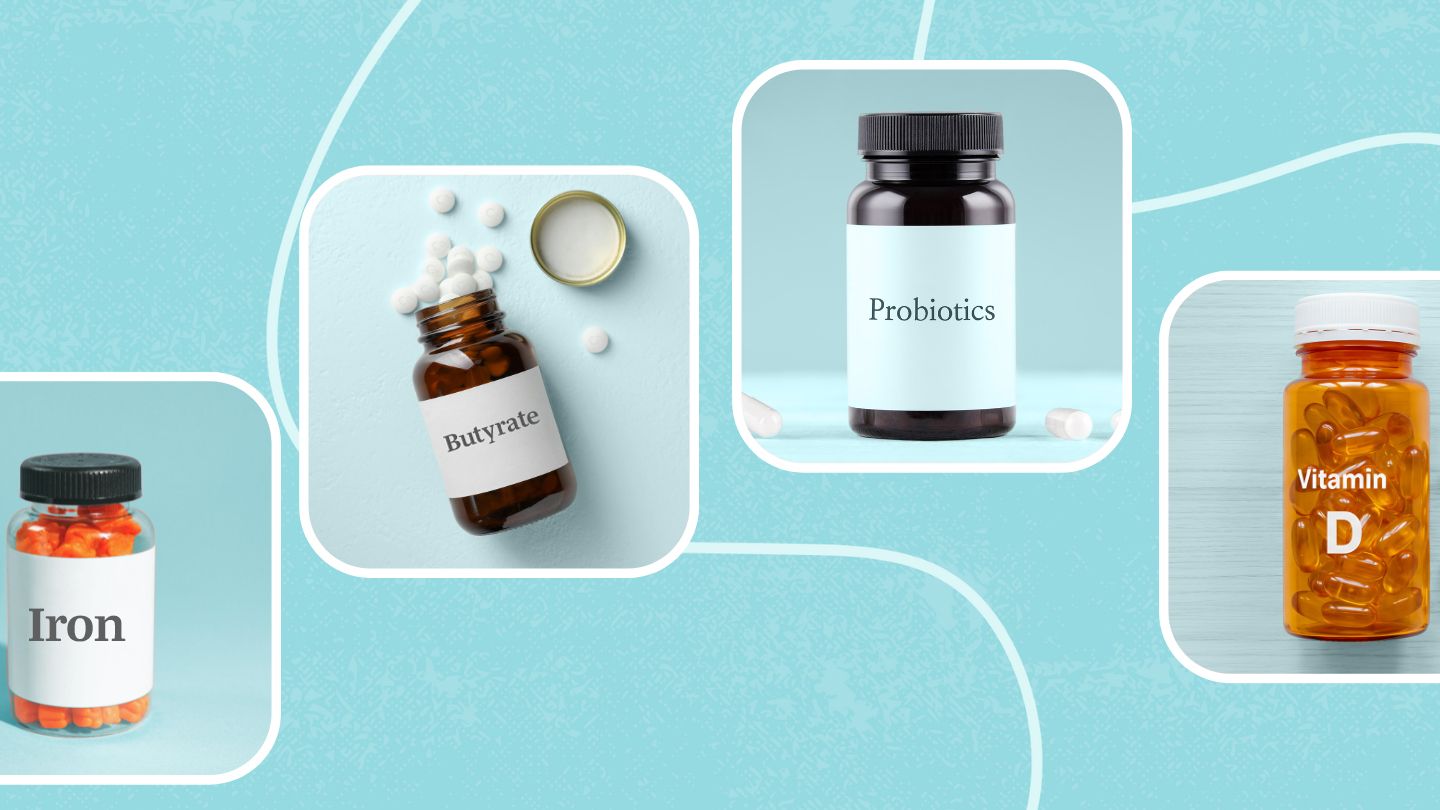Note: The U.S. Food and Drug Administration (FDA) does not approve supplements for safety or effectiveness. Talk to a healthcare professional about whether a supplement is the right fit for your individual health, and about any potential drug interactions or safety concerns.
These seven supplements may help you get the nutrients you need and improve EoE symptoms.
1. Iron
If you have to limit meat in your diet because of EoE, this can cause your iron levels to drop, says Ekta Gupta, MBBS, a gastroenterologist at the University of Maryland Medical Center and an associate professor at the University of Maryland School of Medicine in Baltimore.
“Iron can be an important supplement if someone is limiting their consumption of meat or nuts,” says Alex Koral, MD, a gastroenterologist with Yale Medicine in Trumbull, Connecticut. “A supplement isn’t necessary for most, but is important for those with signs of iron deficiency or anemia.”
Most people can take iron safely, but your healthcare provider may recommend against it if you have a condition that causes iron overload in your blood.
Supplemental iron can come with side effects like nausea, vomiting, constipation, diarrhea, a metallic taste, tooth staining, and upset stomach. These supplements can also interact with some medications, like levodopa-carbidopa (Sinemet) for Parkinson’s disease and levothyroxine (Synthroid) for thyroid hormone deficiency.
2. Vitamin D
“Vitamin D has immunomodulatory [immune system-altering] properties, and low levels are associated with increased allergic inflammation,” says Dr. Gupta. The vitamin may also support healing of the lining of the digestive tract and help reduce flares, she says.
Both a lack of vitamin D from the diet and taking proton pump inhibitors (PPIs) — a common EoE treatment — can affect bone health, says Dr. Koral. “If someone has proven vitamin D deficiency, they should take a regular supplement under the direction of their doctor.”
It’s important to talk to your doctor about how much you need before trying it. Too much vitamin D can cause high calcium levels, which can lead to kidney and heart problems in extreme cases. Vitamin D supplements can also interact with medications including orlistat (Xenical) for weight loss, statin medications for cholesterol, thiazide diuretics for blood pressure, and steroids.
Certain groups have a higher risk for vitamin D toxicity. If you are pregnant, on dialysis, or have an inflammatory bowel disease, your vitamin D dosage should be regularly monitored and adjusted by a healthcare provider.
3. Butyrate
“SCFAs, especially butyrate, can help maintain gut barrier integrity and suppress inflammatory cytokines [proteins] which can sometimes be helpful in controlling symptoms,” says Gupta. But, she says, research around any potential benefits of butyrate for EoE is still limited, and it’s not yet widely recommended for all people with EoE.
If your doctor gives you the okay, you can purchase butyrate as a supplement, which typically includes butyric acid and a type of salt. But the best way to get this nutrient is to eat enough fiber in your diet. The U.S. Department of Agriculture (USDA) recommends getting 25 grams (g) of fiber per day for women, and 35 g for men.
Not much information exists on the safety of butyrate supplements, but some people have reported bloating and food intolerances when taking it. Your provider may recommend against taking butyrate supplements if you are pregnant or breastfeeding.
4. Probiotics
When people talk about the gut microbiome, they’re usually referring to the community of microbes in your large intestine, which can affect inflammation in your entire GI tract. But your esophagus has a microbiome, too.
“There is emerging data on the microbiome in EoE,” says Claire Beveridge, MD, a gastroenterologist at Cleveland Clinic in Ohio. Probiotics may keep the microbiome healthy and reduce EoE symptoms, but more research is needed to know for sure, Dr. Beveridge says. “While we currently lack human data, probiotic use in patients with EoE would be worthwhile investigating.”
One research review found people with EoE had an increased risk of an unbalanced gut microbiome, a factor also associated with PPI treatment. Probiotics show promise for EoE, but specific types may be more helpful than others, so your doctor’s guidance is vital when choosing them.
Probiotics have a very low risk for side effects, but can cause infections in people with a weakened immune system. These supplements can also change how some medications work in your body, like levodopa-carbidopa (Sinemet), digoxin (Lanoxin), and tacrolimus (Prograf).
5. Quercetin
Studies haven’t tested quercetin on humans with EoE yet, but research has shown potential benefits for other inflammatory conditions like rheumatoid arthritis and asthma. There isn’t much research yet on the safety of long-term quercetin supplementation, but existing studies have not shown any harmful side effects.
Quercetin may affect how some medications work, including medicines for cancer, heart disease, and high blood pressure, so it’s important to talk to your doctor before trying it.
6. Vitamin B12
“In patients with EoE who are being treated with proton pump inhibitors, vitamin B12 and magnesium levels can sometimes be low, but we typically don’t preemptively provide supplementation,” says Beveridge. But if your doctor finds you have a deficiency in these nutrients, they can recommend a supplement for you.
Vitamin B12 is considered safe, even at high doses, although it may interact with some medications. Other medications, like PPIs and metformin, can decrease vitamin B12 levels.
7. Zinc
Not much research has evaluated the effects of zinc supplementation for EoE yet, but one small study of 39 adults with the condition reported improved symptoms while taking several dietary supplements, including zinc.
High levels of zinc can cause nausea, dizziness, headaches, stomach upset, vomiting, and poor appetite. These supplements aren’t recommended if you’re pregnant or breastfeeding and don’t have a deficiency. Zinc can also interact with antibiotics, drugs that treat rheumatoid arthritis, and thiazide diuretics, so it’s always best to ask your provider before you start taking it.
The Takeaway
- If you have eosinophilic esophagitis (EoE), you may not be getting all the nutrients you need from food alone. Some people turn to supplements to help fill that gap.
- Some healthcare providers recommend supplements for low levels of iron and vitamin D. Some other supplements have shown promise, but still need more proof of effectiveness in research before they can be recommended widely for EoE.
- If you have EoE and want to know more about taking supplements, your provider can offer recommendations based on your needs.
Read the full article here




